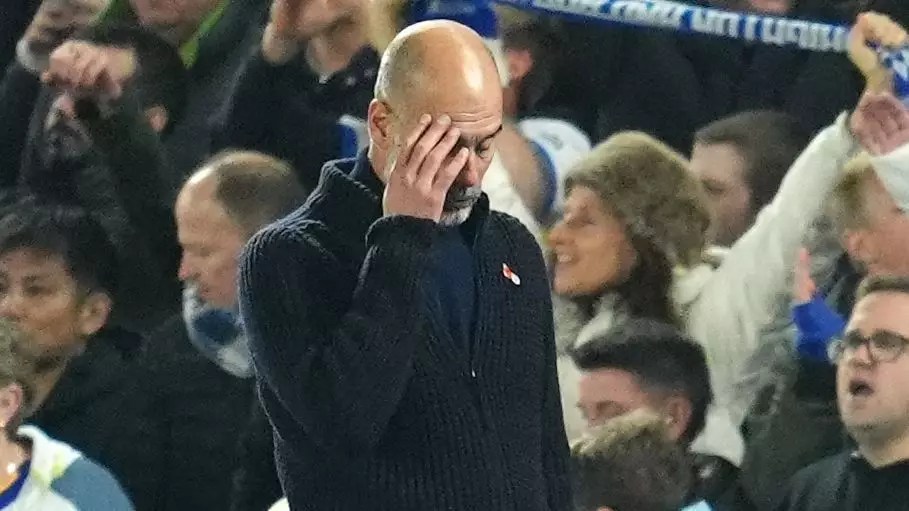Pep Guardiola, often hailed as one of football’s greatest minds, finds himself navigating through uncharted waters following a disheartening streak of losses with Manchester City. The recent defeat to Brighton & Hove Albion marked the fourth consecutive loss for the team, a stat that sheds light on the challenging predicament they face. This article seeks to explore the implications of this downturn, Guardiola’s management approach, team dynamics, and the pressing need for resilience amidst adversity.
The Unprecedented Losing Streak
For a club like Manchester City, the current situation is perplexing. The defeat to Brighton not only pushed the reigning champions five points adrift from league leaders Liverpool, but it also echoed a concerning trend within the squad. This situation is especially alarming considering that City hasn’t experienced four consecutive losses since 2006, a time long before the club’s transformative Abu Dhabi takeover and Guardiola’s tenure. This recent stretch has notably disrupted the sense of invincibility the team had cultivated under Guardiola’s strategic guidance since his arrival in 2016.
For Guardiola, the current circumstance is unprecedented in his managerial career, which commenced in 2007. His previous setbacks were modest compared to what’s unfolding at City; the German Cup defeat and subsequent losses during the 2014-15 season at Bayern Munich didn’t approach the harsh reality of four straight defeats. Hence, the critical question arises: Is this downturn signaling the end of an era marked by success and innovation?
Guardiola’s declarations in the wake of the defeats are telling. While he suggests that fans may anticipate a reckoning of sorts due to the team’s losses, he emphasizes the importance of a full squad—an essential ingredient for the tactical designs that have brought him success. With key players like Rodri—who has been pivotal in the midfield—sidelined due to a season-ending injury, the team’s tactical flexibility is hampered considerably. The unavailability of four key defenders compounds the challenge, forcing Guardiola to navigate these turbulent waters with less than optimal resources.
Despite these setbacks, Guardiola’s frustration is nuanced. There was a semblance of promise in the first half against Brighton, and Erling Haaland’s remarkable goal emphasized the potential still lurking in this squad. However, the inability to sustain that momentum in the second half—a trend echoed in their Champions League performance against Sporting CP—suggests that deeper issues may be at play.
Injuries are a common occurrence in football, yet the cumulative effect of missing key players can lead to a breakdown in team cohesion. Guardiola has noted that asking players to perform at high intensity every few days under injury-stricken conditions is an arduous task. This is compounded by a demanding fixture schedule, making it an uphill battle for City to return to winning ways.
Guardiola’s admission that he requires all of his squad available is a transparent acknowledgment of the challenges he faces. The dynamic nature of a football season means that every match is crucial, and the present injury woes could prove detrimental to their aspirations, not only in the league but also in cup competitions.
As skipper Kyle Walker conveyed, a shift in mindset and effort from the players is fundamental to redefining their trajectory. While managerial influence is vital, the players themselves must take ownership of the situation. A collective effort to overcome adversity is necessary, and it encompasses not just tactical adjustments but also an emotional and psychological resilience that champions are supposed to embody.
This phase could serve as a test of character for Manchester City, one that either reinforces their identity as perennial winners or signals a need for a reevaluation of their strategies and player roles.
While Guardiola’s legacy at Manchester City is well established, the present state of affairs challenges him in ways he has not previously experienced. The need for adaptability, resilience, and collective determination is paramount. Football, after all, is replete with cycles of triumph and tribulation, and how City emerges from this strange period will redefine their future trajectory under Guardiola’s leadership. Whether this is merely a transient hiccup in success or the onset of a restructuring phase remains to be seen, but the eyes of the football world will undoubtedly be watching closely.


Leave a Reply